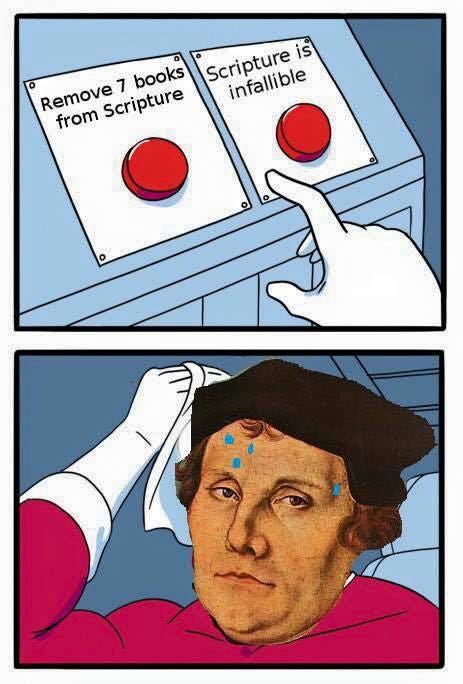Say the Unpopular Thing
Oct 19: Memorial of Saints John de Brébeuf and Isaac Jogues, Priests, and Companions, Martyrs
As Catholic Answers points out, “Romans 3:28 is a key verse in the differences between traditional Protestants and Catholics. You will notice that Paul says a man is justified by faith (pistei in Greek). When Martin Luther translated the letter to the Romans into German in the sixteenth century, he added the word alone —but alone is not in the original Greek text. The phrase “faith alone” does occur in the New Testament: one time, in James 2:24. There the inspired apostle denies that justification is from faith alone. Let me quote it: ‘You see that a man is justified by works and not by faith alone.’”
Martin Luther tried to remove James from the Bible. Although a lot of people didn’t go along with it, he did manage to subtract seven others—
Reading 1
Rom 3:21-30
Brothers and sisters: Now the righteousness of God has been manifested apart from the law, though testified to by the law and the prophets, the righteousness of God through faith in Jesus Christ for all who believe. For there is no distinction; all have sinned and are deprived of the glory of God. They are justified freely by his grace through the redemption in Christ Jesus, whom God set forth as an expiation, through faith, by his Blood, to prove his righteousness because of the forgiveness of sins previously committed, through the forbearance of God– to prove his righteousness in the present time, that he might be righteous and justify the one who has faith in Jesus.
What occasion is there then for boasting? It is ruled out. On what principle, that of works? No, rather on the principle of faith. For we consider that a person is justified by faith apart from works of the law. Does God belong to Jews alone? Does he not belong to Gentiles, too? Yes, also to Gentiles, for God is one and will justify the circumcised on the basis of faith and the uncircumcised through faith.
The point that Paul is making here is that Jesus is our savior, not the old law. We are able to be righteous outside of that law, because of faith in Jesus. That’s because God doesn’t belong only to the Jews; God is open to the Gentiles, too.
Responsorial Psalm
Ps 130:1b-2, 3-4, 5-6ab
R. With the Lord there is mercy, and fullness of redemption.
Out of the depths I cry to you, O LORD;
LORD, hear my voice!
Let your ears be attentive
to my voice in supplication.
R. With the Lord there is mercy, and fullness of redemption.
If you, O LORD, mark iniquities,
Lord, who can stand?
But with you is forgiveness,
that you may be revered.
R. With the Lord there is mercy, and fullness of redemption.
I trust in the LORD;
my soul trusts in his word.
My soul waits for the LORD
more than sentinels wait for the dawn.
R. With the Lord there is mercy, and fullness of redemption.
The Psalmist asks for mercy, because ultimately, that’s all we have. We can try our best, but we’ll never be perfect. If God counted that against us, we wouldn’t be able stand. Our only hope is mercy.
Alleluia
Jn 14:6
R. Alleluia, alleluia.
I am the way and the truth and the life, says the Lord;
no one comes to the Father except through me.
R. Alleluia, alleluia.
Now, we trust in Jesus for forgiveness and redemption to protect us from God’s just punishment.
Gospel
Lk 11:47-54
The Lord said: "Woe to you who build the memorials of the prophets whom your fathers killed. Consequently, you bear witness and give consent to the deeds of your ancestors, for they killed them and you do the building. Therefore, the wisdom of God said, 'I will send to them prophets and Apostles; some of them they will kill and persecute' in order that this generation might be charged with the blood of all the prophets shed since the foundation of the world, from the blood of Abel to the blood of Zechariah who died between the altar and the temple building. Yes, I tell you, this generation will be charged with their blood! Woe to you, scholars of the law! You have taken away the key of knowledge. You yourselves did not enter and you stopped those trying to enter."
When Jesus left, the scribes and Pharisees began to act with hostility toward him and to interrogate him about many things, for they were plotting to catch him at something he might say.
After the Feast of St. Luke, we pick up the story of Jesus at the Pharisees house from last week.
The Pharisees were supposed to be educated, like lawyers. But they (and their predecessors) rejected the prophets and misinterpreted the law (“You have taken away the key of knowledge.”) What’s worse, they have led their followers astray.
Calling them a wicked generation or mocking their cleansing rituals didn’t bother the Pharisees; maybe they thought it was funny, or just didn’t regard Jesus’ opinion as important. But now He insults their education? That’s a bridge too far. Now they decide to start plotting against Him.
Jesus is willing to say the truth, no matter how unpopular it is. It winds up getting Him killed. And that, in turn, is our salvation.




